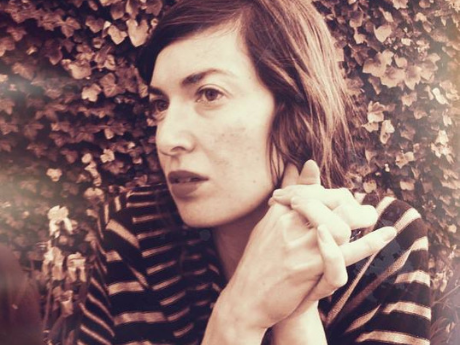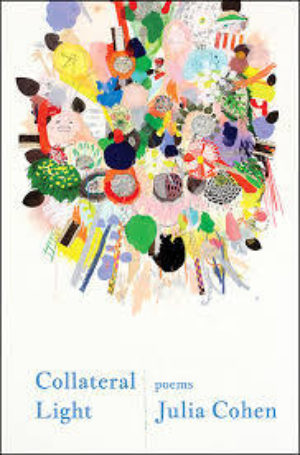In Their Own Words
Julia Cohen's “Call Me a Grown-Up but My Five Eyes Blink at Once”

Call Me a Grown-Up but My Five Eyes Blink at Once
When I dug in the backyard I knew nothing could cut me
Soft hair & a mind trenching memory like dirt
like how the sound & taste of chewing snow is the same
my frequency framed in chives & locust-drawings
against fevered whiteness dipped in fevered whiteness
***
Meet at the juniper where the creek turns east
For reckoning retain the ticket
366 days in a leap year cognate child
A dedication in the microphone: fury of velveteen
that was 18 years ago
You only feel invincible twice in your life
To dissect the rarified heart
especially bird
***
Primordial fronds with 3D daffodils in the dreamscape
chase large rodents into the ghost forest:
the animal in my right arm was a superhero cape
a cape to give the younger brother with a hammer
the animal in my leg was the deep humiliation
of crawling up the stairs
If the fever is age or anxiety can I lean in
& sweep the whiteness away
I miss the charm of a sturdy memory like a missing limb
***
Now I can't stop gripping grip with my neck
if I have to
I can't reenact the conversations
but I won't coat myself with milk paint
I see bodies but the words are gone they took place
near a lake eaten by fevered whiteness
as if a stone sums up the land that stands behind it
In the distance a soft child counting a sequence
of ants or misters
***
Spidery arrangements a child unnamed for safety
to double back & throw myself off my own trail
I'm only embarrassed when I embarrass you
the deepest well I ever fell into
Too busy relaying information to absorb it
"I didn't write it I only wrote / it down"
a hammer eliminates the need for help?
Drift-wood finish basis of the charm
signs of soft child activity show up least
the marks of hammers
Fever takes you like an undertow like mister
***
Help remember calm me down to remember
I spelled my name with mud & sold it at a lemonade stand
If you misplace directions for making the deception
you want to make use blood to color the milk paint
behind the fence a curtsey
Anyone is anyone else because deep down
they have a face?
Dab a little water without disease
***
It's exhausting everyone asking to feel alive!
But I drew an incorrect candle or I drew the perfect
candle & it was still rejected
The last seven seconds watch the body
roll away from my head
That log is not a bridge when the mud dries
Somewhere I am a goldenchild
where I speak for the poem
Now beat back against what you made
From Collateral Light (Brooklyn Arts Press, 2013). All rights reserved. Reprinted with the permission of the author.
On "Call Me a Grown-Up but My Five Eyes Blink at Once"
My childhood was built atop an apple orchard. Or rather, my childhood home was constructed on what used to be a former orchard. A single crab apple tree in our backyard remains. My friend Katie and I (both of us six years old) were digging in the backyard when we discovered a buried trash heap that must have been quite old. Tins with cursive logos of companies that no longer existed; opaque and imperfectly blown thick glass bottles. I.e. treasure. We spent days secretly digging and sorting through the rubble, carefully selecting the "valuable" items from those broken or "too boring" to save, storing them in an egg crate.
Finally, we showed my mother, who was impressed but also concerned that we were playing with broken glass and rusty metals. While most parents would have immediately stopped their children from mucking around in dangerous garbage, my mother understood our glee and wonder. She gave us rubber gloves and boots and sent us back out. I remember understanding that she was being generous—allowing us discoveries despite the risk of scrapes—but I also remember feeling that despite logic, I knew nothing could harm us on this adventure. I couldn't explain it. It was a feeling of illogical certainty. It was certainty and it felt (deceptively) invincible. We didn't need the gloves or boots.
My poems are not narrative in the traditional sense. There is not an identifiable plot. The story of treasure-seeking children has been pared down to a single, first line of the poem above. But I hope an emotional and philosophical arc can be detected. Like this one, many poems in Collateral Light are constructed by distilling memories to their emotional origins to help the private self connect with and reach out to others. Composed of image-heavy poems, this collection centers on the creativity of memory as well as the anxiety of forgetfulness. It explores how these elements play into identity formation, emotional resonances, and the ways we can translate and convey subjective experiences. Here are a few persistent threads in the poem:
Thread #1: Glimpses of distilled memories that carry certain emotions. I want to give the reader the feeling of the memory minus the weight of the entire story. I want to render its original context unnecessary, to create new context, to appropriate, consume, wrestle, recombine. For instance, "I spelled my name in mud & sold it at a lemonade stand." As a kid, I actually sold food-shaped mud (mud hot dogs and hamburgers, mostly) and mud alphabet letters at a stand. I did not make much money, although overhead was low.
Thread #2: The anxiety of losing memory, of having formative experiences dissolve, swing out of reach. As though, at the end of a hard day of hiking, you turn around to find that the trail you knew you had bivouacked has vanished. That is the "fevered whiteness," I think.
Thread #3: Anxiety is not a feeling. It actually gets in the way of feeling. It pushes us out of the present moment. It allows us to absorb less. To take in less. So, how to battle this?
Thread #4: This poem ends with "Now beat back against what you made." In a sense, what is the point of anxiety if ultimately, the aim is not to develop static certainty but doubt? I both advocate for and struggle to live in a constant state of revision.
Most of my poems don't start with a specific departure point. They begin with a strange image I want to tie to an emotional field or with an emotional field for which I want to create an imagistic trajectory. I think this poem explores how to let go of certain sharp angles of childhood as well as how to let go of the anxiety in losing this imagistic and emotional reservoir. Then, to aim the reader toward a new river of doubt and uncertainty, whose bends and currents may be more unpredictable, but also more transformative.



